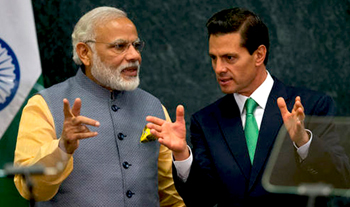Mexico City, Jun 9: India has bagged crucial support from Mexico and Switzerland, two important members of the Nuclear Suppliers Group (NSG), ahead of a meeting called by the 48-member bloc when India's application for membership is expected to be taken up.
 On Wednesday, Mexican President Enrique PeNa Nieto extended his country's support, saying Mexico supports "positively and constructively India's membership of the NSG".
On Wednesday, Mexican President Enrique PeNa Nieto extended his country's support, saying Mexico supports "positively and constructively India's membership of the NSG".
Prime Minister Narendra Modi, on a five-hour stop over visit to the country, thanked President Nieto for his support.
"I thank President Pena Nieto for Mexico's positive and constructive support for India's membership of the NSG," Modi said in his speech after talks between the two leaders here.
Modi had included Mexico and Switzerland in the last minute into his tour itinerary, which originally was for Afghanistan, Qatar and the US.
India's diplomatic efforts appeared to have borne fruit, with both Switzerland and Mexico backing India's membership to the elite club that regulates global nuclear trade.
On June 6, Switzerland, an important member of the NSG, extended support to India's membership in the group during Modi's stopover in Geneva.
The 48-member NSG has called an "extraordinary" plenary meeting on Thursday when it is expected to take up for review India's application for membership.
India submitted its application in early May to become a member.
Both Switzerland and Mexico had earlier expressed strong reservations on India's application for becoming a member of the elite export control regime due to India being a non-signatory of the nuclear Non-Proliferation Treaty (NPT). Consensus among the bloc members is important in allowing entry to a new country.
India has got strong backing from the US for NSG membership with President Barack Obama extending support during Modia's visit to the US on Tuesday.
India has already got the support of other major NSG countries, including France, Russia and Britain.
China, a major NSG member, is still holding out, citing that India needs to sign the NPT.
India has not signed the NPT on the ground that it is discriminatory.
Pakistan has also applied to become a member of the club, and is being backed by China. Beijing is keen to see that Islamabad gets on board, despite the latter's poor non proliferation record.
The US has been trying to convince China to support India's bid, and US Secretary of State John Kerry was in Beijing earlier this week to try and get around China's reservations on supporting India.
Modi's is the first visit by an Indian Prime Minister to Mexico after then Prime Minister Manmohan Singh's visit in 2012 for the G20 Summit.
Mexico is the last stop in Modi's five-nation tour. He leaves for India on Thursday.





Comments
Add new comment